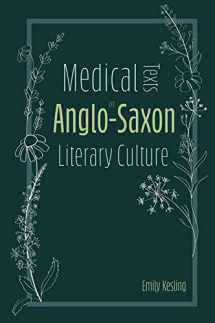
Medical Texts in Anglo-Saxon Literary Culture (Anglo-Saxon Studies, 38)
Book details
Summary
Description
Four complete medical collections survive from Anglo-Saxon England. These were first edited by Oswald Cockayne in the nineteenth century and came to be known by the names Bald's Leechbook, Leechbook III, the Lacnunga, and the Old English Pharmacopeia. Together these works represent the earliest complete collections of medical material in a western vernacular language.This book examines these texts as products of a learned literary culture. While earlier scholarship tended to emphasise the relationship of these works to folk belief or popular culture, this study suggests that all four extant collections were probably produced in major ecclesiastical centres. It examines the collections individually, emphasising their differences of content and purpose, while arguing that each consistently displays connections with an elite intellectual culture. The final chapter considers the fundamentally positive depiction of doctors and medicine found within literary and ecclesiastical works from the period and suggests that the high esteem for medicine in literate circles may have favoured the study and translation of medical texts.


We would LOVE it if you could help us and other readers by reviewing the book
Book review



